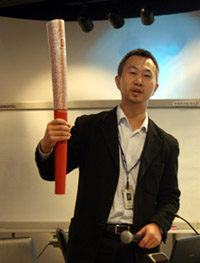北京2008年奥运会火炬亮相北京。这款由联想创新事业中心设计的火炬,以中国传统的纸卷轴为造型,外表为源于汉代的漆红色祥云图案,具有浓烈的中国特色,充分展示了中国的艺术设计与科技水平,体现了北京2008年奥运会“绿色奥运、科技奥运、人文奥运”的举办理念。
 |
| Yao Yingjia,chief of the torch design team at the Innovation Design Center of Lenovo Group,holds the torch while explaining the design concept.[Xinhua] |
Designed to resemble an ancient scroll and featuring a 'lucky cloud,' the red and silver torch for the 2008 Beijing Olympic Games settled the debate over whether toforegroundChinese traditional or modern elements by incorporating both.
Yao Yingjia, chief of the torch design team at the Innovation Design Center of Lenovo Group, said some of their initial ideas were a bit too far outside the box.
"After receiving the invitation letter for the Olympic torch (in 2005), our team was very excited and some crazy ideas came up duringbrainstorming."
"Some basic ideas impressed us, though, such as images of lucky clouds, jade and bamboo. From the very beginning, we realized that we should show the world something with clear Chinese elements."
Lucky clouds, orauspicious clouds, are commonly used in Chinese mythology, on with deities often perched on top. Chinese people expect the auspicious clouds to bring blessings and harmony society.
The designers finally whittled down their ideas into three designs - featuring a lucky cloud, a phoenix and the Great Wall, respectively - and proposed these to the Beijing Organizing Committee for the Games of the XXIX Olympiad (BOCOG).
BOCOG's judges were impressed and selected the lucky cloud theme.
"The lucky cloud is a symbol of traditional Chinese culture that is rooted in the everyday lives of Chinese people. We can see it in many things from sculptures to architecture to utensils to furniture," said Yao.
"It also bears the Asian spirit of harmony. Through this image, we would like to spread a message of peace and promote Chinese culture to the rest of the world."
Choosing the scroll theme was also a lucky accident, said senior team member Qiu Jiayu.
"We came up with the idea when a colleague rolled up a piece of paper casually at a meeting and we saw that it naturally resembled the shape of the torch."
"Paper is one of the four great inventions in ancient China that was spread to the rest of the world along the ancient Silk Road. Since the planned torch relay route borrowed the idea of the Silk Road, we thought the idea was perfect."
The team decided to cover the torch with rubberized paint to make it more 'human.'
"When they hold the torch, the bearers can feel more of a human-like touch, which is in line with the passing of the flame from person to person," Qiu said.
When it came to choosing the color, there wasn't much of a debate. The torch will be the first in the history of the Olympics to bear the color red.
"Red is the classic color people associate with China," said Yao. "Carving red clouds on a silver base suggests a combination of ancient China and the modern world."
For Lenovo, the design process was a team effort that tied up almost all of its 87 staff - more than double its core team of 34.
Looking at the final aluminium product, standing 72 centimeters and weighing some 985 grams, Yao said it was worth the effort.
Besides designing the shape, the inside burning system was produced by China Aerospace Science & Industry Corporation (CASIC).
Now the torch can withstand winds of up to 65 km/hour and stay alight in rain, hail or snow. The light yellow flame can burn for over 15 minutes at a time and will be fueled by propane, a relatively clean energy source.
Vocabulary:
foreground:突出
brainstorming:自由讨论
auspicious clouds:祥云
(实习生江巍 英语点津boeybb编辑)
点击查看更多奥运新闻